BELONGING
E PLURIBUS UNUM
“Out of many, one”
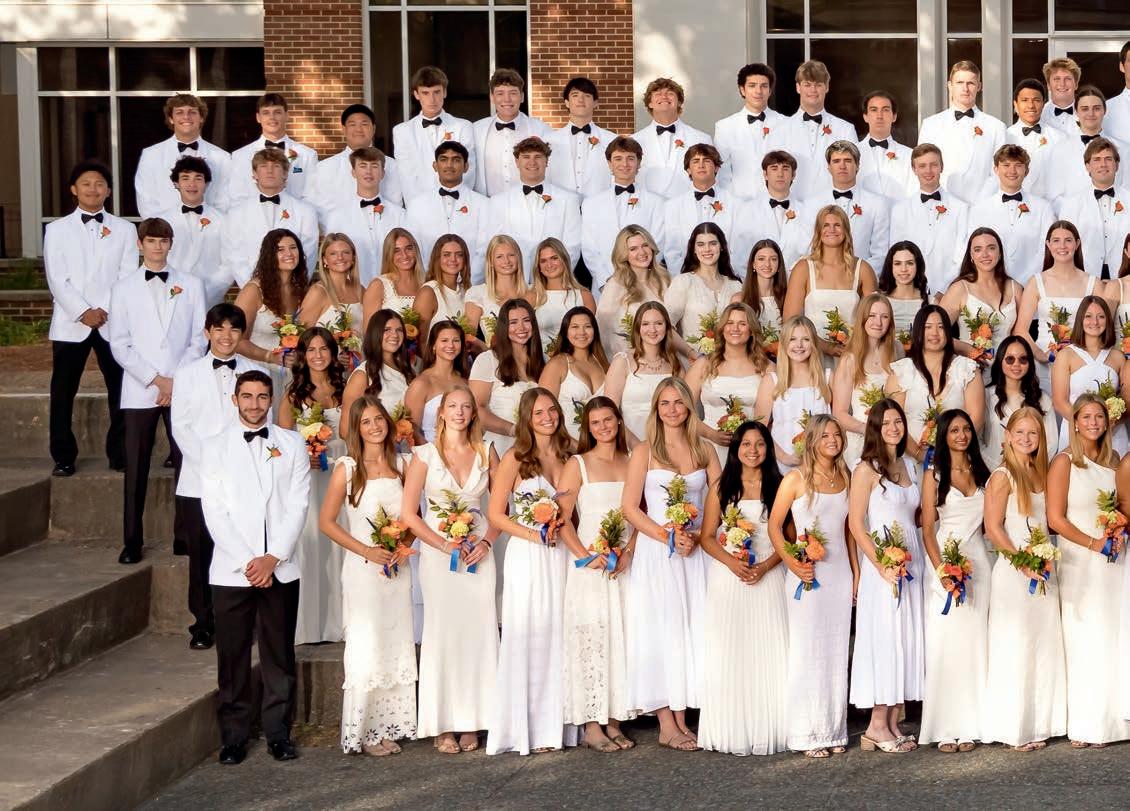
Norfolk Academy believes that the diversity of our community leads children to develop a greater sense of understanding, empathy, and responsibility. Our school strives to foster a climate of belonging, so that each member of our Bulldog family feels secure, respected, and valued as an individual. To that end, the school seeks to provide unrestricted access for all students to the enriching relationships and array of experiences that de ne a Norfolk Academy education. Our hope is that our students and graduates will carry forward these principles to create a just society where all people have the opportunity to ourish.
Our Commitment to DIVERSITY, EQUITY, AND JUSTICE
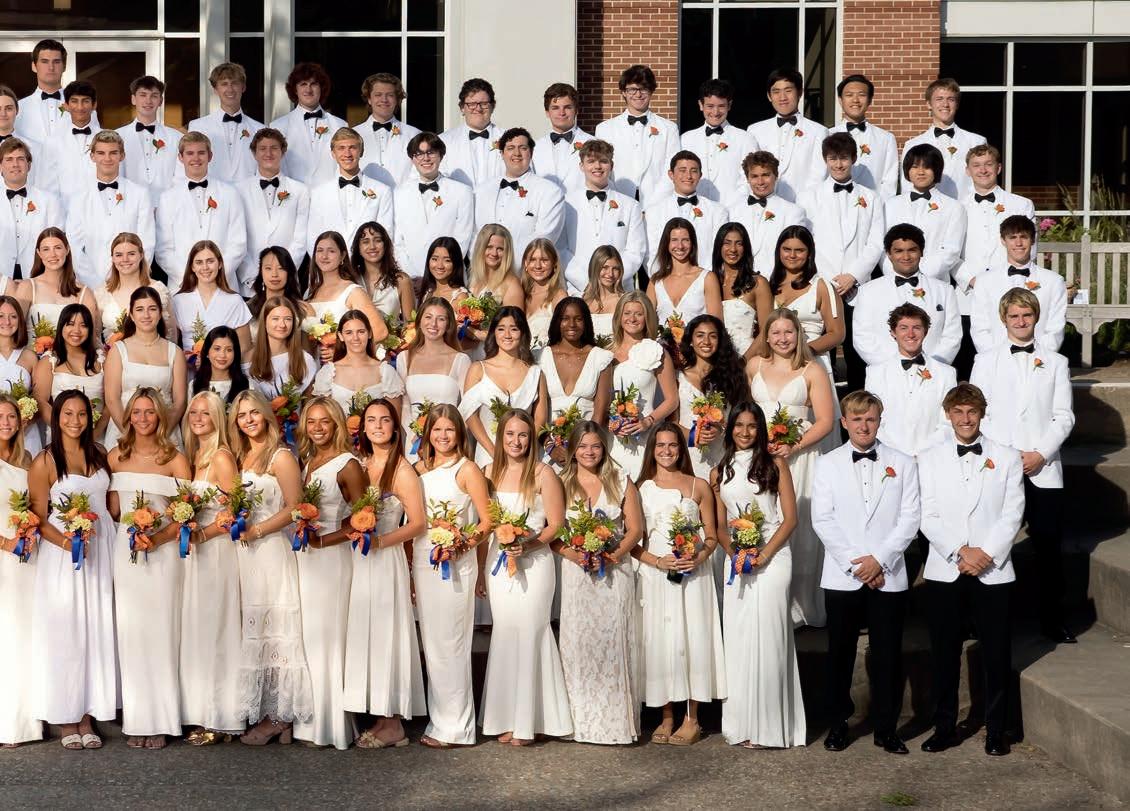
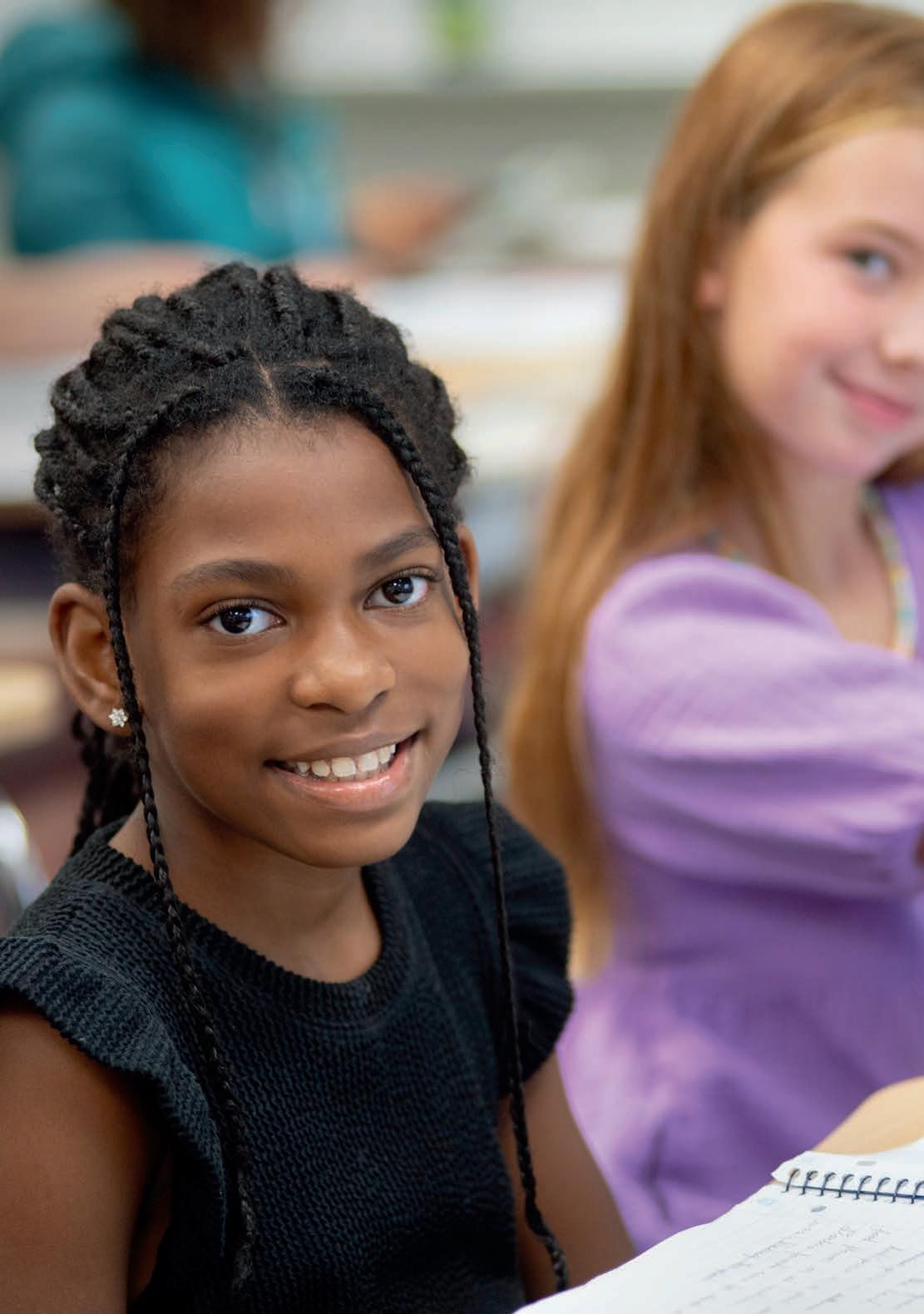
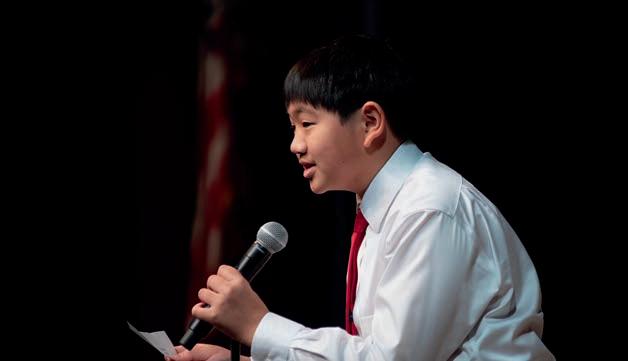
DAILY PUBLIC SPEAKING
Building con dence: The foundation of the Norfolk Academy public speaking curriculum, the Girl and Boy of the Day program allows students the opportunity to present their learning to their peers. Students share stories of their family/ cultural traditions and present research on history-makers of various races and ethnicities, among many other topics.
GUIDANCE PROGRAM
Understanding ourselves and others: The guidance program complements our purpose of meeting the needs of the whole child. During class conversations with school counselors, students dive into discussions about self-awareness, diversity, and healthy habits, as well as how to show respect and kindness towards each other, their teachers, and their community.
CHAPEL
Cultivating community: All students and faculty come together each month for what we call “Chapel,” a gathering that focuses on building moral character through themes such as showing kindness, listening with compassion, engaging honestly with others, and creating a close-knit community.
CURRICULAR CONNECTIONS
Broadening perspectives: Students explore American history and society as well as world cultures through reading, discussion, and creative projects that build depth of understanding. Sample topics include African and Ancient Egyptian kingdoms, dynasties, and cultures; the Civil Rights Movement and Leaders; the Holocaust; and World Religions. The Cooper Library o ers a wide array of books which incorporate themes and topics to explore self-awareness, relationships, and belonging. Guest speakers, storytellers, and eld trips build students’ curiosity.

NINTH GRADE SPEECH PROGRAM
28 New Students
321 Middle School
Enrollment with 29% Racial/Ethnic Diversity
Strengthening your voice: Under the guidance of a faculty advisor, each 9th grader delivers a 5–7 minute, researchbased, persuasive speech to all Middle School students and faculty, learning to harness the power of their voice. Many use this opportunity to educate their peers on topics including healthcare, education, technology, social justice, globalization, and the environment. Speeches provide an opportunity for students to explore new ideas, grow intellectually, and express their ideas with a public voice and con dence. As students and faculty gather each morning, their shared excitement about the daily speech strengthens our sense of community and connection through scholarship and individual discovery.

COMMUNITY PARTNERSHIPS AND STUDENT GROUPS
Building bridges: Students partner with more than 20 local organizations, learning about the work they do to support our community, some of the most signi cant problems they face, and ways our students might be a part of the solution. The year-long process is iterative in nature, leveraging many of the pillars of a traditional design-thinking framework: students engage in a series of empathy-building activities such as researching, brainstorming and prototyping, hands-on service work, and implementing sustainable solutions.
CURRICULAR CONNECTIONS
Widening the aperture: The English course in 7th grade is anchored in the exploration of literary forms, while the 8th grade English course focuses on identity exploration, and the 9th grade courses examine shifting worldviews and the emerging understanding that comes with adolescence. The curriculum encourages students to explore cultures and perspectives.
In history courses, students have the opportunity to learn through analysis of primary documents and rst-hand narratives. Students examine and consider history through geographical, cultural, and sociological lenses, understand the ways in which physical characteristics of places in uence culture, and learn to broaden their worldview.
Mathematics and science o erings develop students’ critical thinking and communication skills and provide a foundation for modeling and experiencing the natural world. These disciplines provide challenging and relevant experiences and serve as a driving force in the growth of informed decision-making and problem-solving. We also a ord students opportunities and leading-edge coursework in our distinctive and innovative Engineering, Design, and Innovation (EDI) curriculum.
“Norfolk Academy has taught me what it means to be a part of a community. Being a part of something larger than yourself is an incredible feeling and gives you an opportunity to contribute to the common good.”
— Will ’25
New Students
SENIOR SPEECH PROGRAM
Delivering a capstone experience: Every senior delivers an 8-minute persuasive speech in the Johnson Theater for an audience of all Upper School students and faculty. Students select their topics and develop rhetorical, argumentative, and oratorical skills with guidance from a faculty advisor. Topics range widely and include national and global issues, as well as relevant and current human challenges such as climate change, international relations, poverty, and healthcare. Alumni of the school recall their senior speech as a galvanizing experience that builds their skill and sense of con dence in critical thinking and public speaking.
Upper School
Enrollment with 24%
Racial/Ethnic Diversity
COMMUNITY PARTNERSHIPS AND STUDENT GROUPS
Building meaningful connections: As a private school with a public purpose, the school’s relationships with community partners help students increase their awareness of local issues and hone problem-solving skills. Students and faculty work in partnership with a variety of local, national, and international organizations to continue strengthening connections between our school community and the larger world. The Upper School is home to more than 25 studentled organizations, councils, publications, and clubs through which students pursue their interests in service, social justice, and leadership.
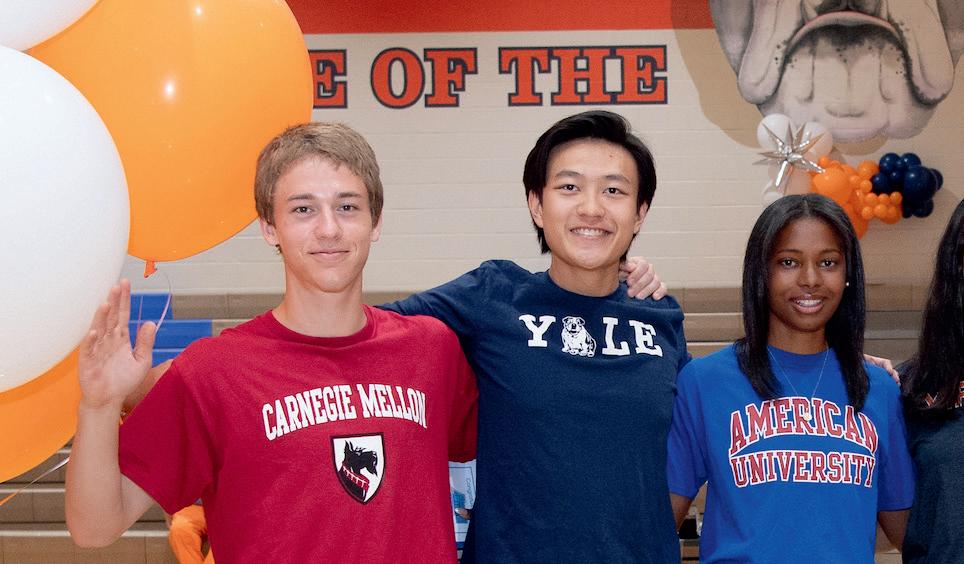
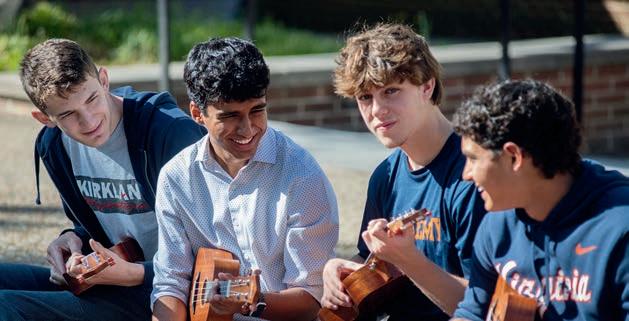
CURRICULAR CONNECTIONS
Expanding academic horizons: A diverse, forward-looking, and dynamic curriculum gives students the opportunity to build depth of understanding and discover their passions. Our school’s Philosophy & Objectives call for a commitment to “the principles of academic freedom” and for “judicious experimentation with the new.” Students have the freedom to explore ideas and develop passionate interests, as they advance their learning with college-level coursework in all disciplines.
Maymester, a two-week program of experiential learning, gives sophomores and juniors the chance to combine domestic and international travel, research, and project-based learning. A sampling of more than 15 recent o erings included courses exploring environmental sustainability, architecture, immigration issues, archaeology, and wellness. Students also have myriad opportunities to pursue professional internships with local businesses and nonpro ts.
“Nowhere else will you nd a community of people who care for each other and are always cheering you on. Being a Bulldog has been the greatest privilege, and I am a better person as a result of this place that I get to call my second home.”
— Sydney ’25
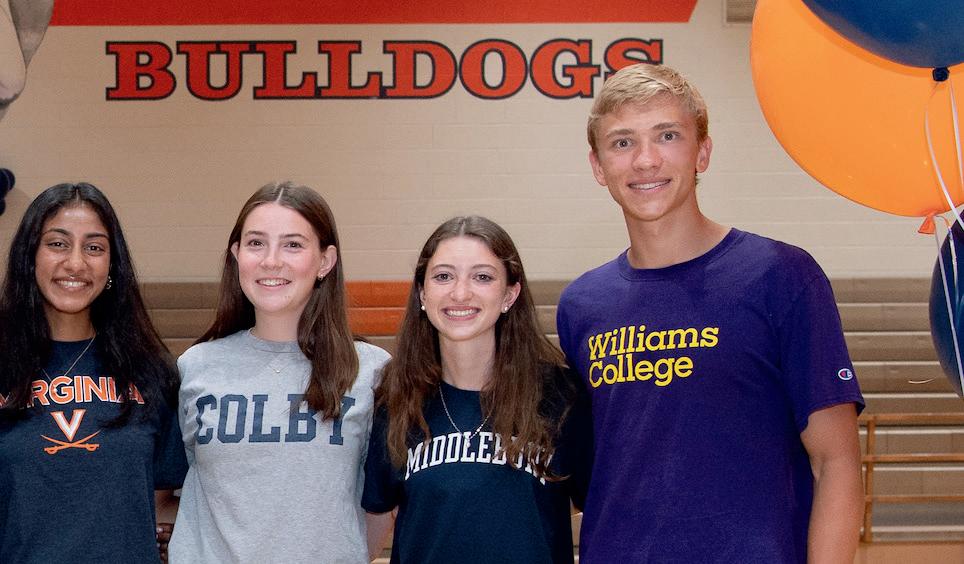






GEOGRAPHIC DIVERSITY
Norfolk Academy enrolls students from cities in Hampton Roads, North Carolina and the Eastern Shore.
Breakdown of enrollment: Virginia Beach (63%), Norfolk (21%), Chesapeake (10%), Su olk (2%), Portsmouth (2%), Other (2%)



BOARD



























SOCIOECONOMIC DIVERSITY
Norfolk Academy provides for more than $3 million in nancial aid, which is distributed annually in the form of tuition awards. Awards are based solely on a family’s demonstrated nancial need.
84% of applicants received awards
Average size of award
Awards range from to
$15,367 $1,000 $31,500
18% of enrolled students receive aid
More than
$3 MILLION in awards given
NOTICE OF NON-DISCRIMINATORY POLICY
Norfolk Academy admits students of any race, sex, sexual orientation, gender identity, religion, color, and national or ethnic origin to all the rights, privileges, programs, and activities generally accorded or made available to students at the school. It does not discriminate on the basis of race, sex, sexual orientation, gender identity, religion, color, and national or ethnic origin, or any other basis prohibited by federal or state law in the administration of its educational policies, admissions policies, employment policies, scholarship and loan programs, and athletic or other school-administered programs.
“... dedicated to enrolling children who demonstrate intellectual promise and curiosity and come from varied social, economic, religious, ethnic, and racial backgrounds, recognizing that such diversity of perspectives and thought leads children to develop a greater sense of understanding, empathy, and responsibility.”
— from Norfolk Academy’s Philosophy & Objectives
